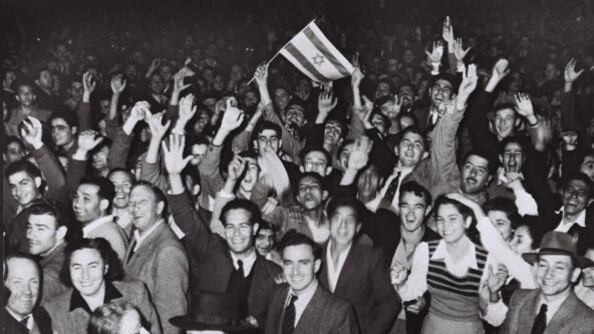In our base ten culture, which gives mystical power to anniversary milestones ending in five or zero, this November—in addition to being Native American Heritage Month, National Homeless Youth Awareness Month, National Novel Writing Month, and Lung Cancer Awareness Month—should become “Israel Legitimacy Month,” using two anniversaries to celebrate the legitimacy of the Zionist project. November 2 will mark the 95th anniversary of the Balfour Declaration, official British acknowledgement of the need for a Jewish homeland that culminated thirty years later—sixty-five years ago—on November 29, 1947, when the United Nations officially endorsed a Jewish state—and an Arab entity—in partitioning the land of Palestine.

In celebrating, it is important to note how unjust it is that we have to turn what should be simple celebrations into complex justifications. Israel should not have to defend its legitimacy. In a world wherein nationalism remains the central constitutive political force, most nations can enjoy the luxury of having their national rights respected, even taken for granted. But Israel and Zionism have been subjected to a systematic campaign of delegitimization targeting Jewish nationalism and Jews’ ties to their historic homeland, while questioning the validity and viability of Israel itself. We have to risk appearing defensive—even while acknowledging the disproportionate singling out—so as not to be unduly naïve, undereducated, and unprepared.
Moreover, in asserting Jewish national claims and Israel’s legitimacy we need not fall into the mutually exclusive trap and negate Palestinian claims. In a world that tends to give claims of national rights of self-determination the benefit of the doubt, both Jewish claims and Palestinian claims have their own legitimacy and historical pedigree.
The great significance of the Balfour Declaration, issued as a letter by the British Foreign Secretary Lord Arthur James Balfour on November 2, 1917, stems essentially from the power at the time of Great Britain in drawing most of the map of today’s Middle East. When “His Majesty’s government,” in all its imperial grandeur, looked with favor on “the establishment in Palestine of a national home for the Jewish people,” the movement that Theodor Herzl had started twenty years earlier to articulate a nearly two-thousand-year-old dream of redemption received international legitimacy. When the British General Edmund Allenby captured Jerusalem five weeks later on December 9, 1917, military might reinforced the diplomatic vision. These moves led to the British mandate over Palestine, a period of stability, prosperity, and population growth for both the Jewish Palestinians and the Arab Palestinians, as they were called at the time. The fact that Jews from Europe and Arabs from the Middle East flowed into the newly flourishing Jerusalem and environs at the time should remind us that borders shifted and people moved—two essential historical insights that shape my openness to compromise on boundaries today.
Alas, during the British mandate, enmity between the two groups built up, along with the two populations and the infrastructure of a Jewish state. Nevertheless, as the historian Efraim Karsh shows in his important book "Palestine Betrayed," there were also strong, healthy, grassroots relations among many Jews and Arabs.
Karsh’s title reflects his indictment of the Palestinian Arab leadership. The Hitlerite demagogue Haj Amin al-Husseini, and other extremist Arab leaders betrayed their people—and the vision of two peoples living side by side—by fomenting violence and, when offered a partition compromise by the United Nations in 1947, rejecting it outright and calling for Holy War instead.
Yes. I can respect Palestinian claims even while criticizing their leadership for rejecting that compromise—and others. And yes, we should return to the joy of November 29, 1947, when dancing broke out spontaneously throughout the Jewish world to celebrate the new world body’s validation of a Jewish state—even though Jews were also compromising, including accepting the internationalization of Jerusalem, their precious national capital.
Unfortunately, today, 95 years after the Balfour Declaration, and 65 years after the UN Partition plan, too many are ignorant of the history—and too many others purposely distort what happened. History should not offer handcuffs, shackling us to past realities that prevent compromise in the present. But history can teach us that, despite many attempts today to delegitimize Israel, Zionism, and the very notion of Jewish peoplehood, Jewish rights are historically valid, legally legitimate and cause for celebration.






